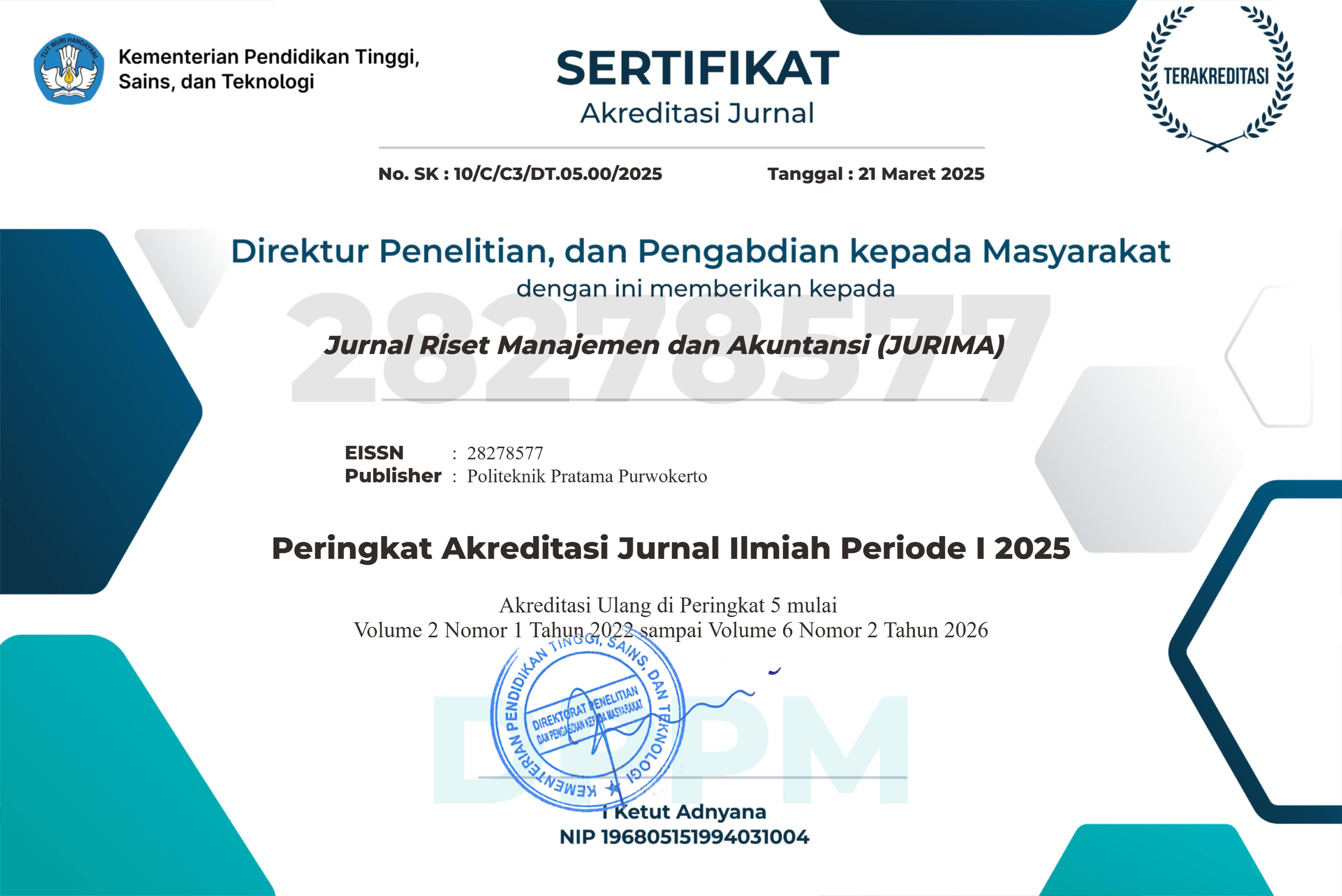Pengaruh Literasi Keuangan dan Penggunaan E-Wallet Terhadap Sikap Keuangan Dikalangan Mahasiswa Fakultas Ekonomi UKRI
DOI:
https://doi.org/10.55606/jurima.v5i2.5224Keywords:
Financial Literacy, E-Wallet, Financial AttitudeAbstract
This study was conducted to examine the influence of financial literacy and e-wallet usage on the attitudes of students of the Faculty of Economics, National University of the Republic of Indonesia (UKRI). The background of this study is the rapid growth of e-wallet usage among the younger generation, especially generation Z, which is not always accompanied by adequate financial literacy skills. This study uses a quantitative approach with a survey method by distributing questionnaires to 90 student respondents. Data assistance analysis was carried out using multiple linear regression with SPSS software version 25. The results of the study show that partially, both financial literacy and e-wallet usage have a positive and significant effect on students' financial attitudes. Simultaneously, both variables also have a significant effect with a coefficient of determination (Adjusted R²) of 39.5%, which indicates that financial literacy and e-wallet usage together are able to explain the financial attitude variable by 39.5%. This finding emphasizes the importance of strengthening financial literacy and utilizing financial technology wisely to form more positive financial attitudes among students.
Downloads
References
Ajzen, I. (1991). The theory of planned behavior. Organizational Behavior and Human Decision Processes, 50(2), 179–211. https://doi.org/10.1016/0749-5978(91)90020-T
Apriadi, D., Adelin, D., Mutumanikam, P. R., & Lanjarsih, L. (2025). Personal Finance Transformation in the Digital Era: The Impact of Financial Technology on People’s Economic Behavior. 2(3). https://doi.org/10.61942/oikonomia.v2i3.356
Arifa, D., Asriany, A., & Samsinar, S. (2024). The Effect Of Fintech E-Wallet (Shopeepay) And Financial Literacy On Student Consumptive Behavior Dira Arifa Samsinar Samsinar. In Home / Archives (Vol. 1, Issue 1). https://journal.conference.umpalopo.ac.id/index.php/icbens/article/view/106
Bandura, A. (1997). Bandura_SocialLearningTheory.
Becker, G. S. (1964). Human Capital: A Theoretical and Empirical Analysis, with Special Reference to Education. https://www.ssrn.com/
Bhattacherjee, A. (2001). Understanding information systems continuance: An expectation-confirmation model. MIS Quarterly: Management Information Systems, 25(3), 351–370. https://doi.org/10.2307/3250921
Cuandra, F., & Desianti, D. (2022). PENGARUH FINANCIAL LITERACY, PEERS INFLUENCE, SELF-CONTROL, RELIGIOUS BELIEF DANPARENTAL SOCIALIZATION TERHADAPSAVINGBEHAVIORPADA MAHASISWA DI KOTA BATAM. In Jurnal Ilmu Manajemen (Vol. 10).
Davis, F. D. (1989). Perceived usefulness, perceived ease of use, and user acceptance of information technology. MIS Quarterly: Management Information Systems, 13(3), 319–339. https://doi.org/10.2307/249008
Dewi Pertiwi, R., Yolanda Putri, D., Laksniyunita Prodi Manajemen, W., Ekonomi, F., & Author Dewi Pertiwi, C. R. (2023). Empowering MSMEs Through Digital Marketing to Increase Product Sales. Journal Abdimas Paspama, 02, 48–57. https://doi.org/10.xxxxx
FE UKRI. (2025). FAKULTAS EKONOMI UNIVERSITAS KEBANGSAAN REPUBLIK INDONESIA. https://fe.ukri.ac.id/alumni
Ferine, K. F., Utami, E. Y., Thalib, N., Laksniyunita, W., & Boari, Y. (2024). PENGARUH LITERASI DIGITAL, EFIKASI DIRI DAN LINGKUNGAN TERHADAP MINAT BERWIRAUSAHA MAHASISWA GENERASI Z DALAM E BUSINES.
Fhisbein, M. A., & Ajzen, I. (1975). Belief, attitude, intention and behaviour: An introduction to theory and research.
Gomber, P., Koch, J. A., & Siering, M. (2017). Digital Finance and FinTech: current research and future research directions. Journal of Business Economics, 87(5), 537–580. https://doi.org/10.1007/s11573-017-0852-x
Kharisma, N. I., Totalia, S. A., & Octoria, D. (2024). Pengaruh Pendapatan dan Literasi Keuangan terhadap Penggunaan E Wallet pada Mahasiswa Fakultas Keguruan dan Ilmu Pendidikan Universitas Sebelas Maret.
Kiran, M. C., & Singh, K. (2024). Financial Literacy and Dimensions: A Systematic Roadmap for Future. 14(2). http://eelet.org.uk
Luthfiannisa, G., & Meidiaswati, H. (2024). Pengaruh family financial socialization, income, self-control dan financial attitude terhadap saving behavior generasi sandwich.
Mubyl, M., Abidin, A., & Ramadhani, N. M. (2021). FAKTOR-FAKTOR YANG MEMPENGARUHI MINAT PENGGUNAAN E-WALLET (STUDI KASUS PADA MAHASISWA KOTA MAKASSAR). https://e-jurnal.nobel.ac.id/index.php/NMaR
OECD. (2020). OECD/INFE 2020 International Survey of Adult Financial Literacy.
OJK. (2025). Edukasi Keuangan.
Putri, E. S., & Indriastuti, D. R. (2025). PENGARUH FINANCIAL LITERACY, FINTECH E-WALLET DAN FINANCIAL ATTITUDE TERHADAP PERILAKU KONSUMTIF PENGGUNA E-COMMERCESHOPEE PADA MAHASISWA FAKULTAS EKONOMI DAN BISNIS UNIVERSITAS SLAMET RIYADI SURAKARTA. 2(2), 158–171. https://doi.org/10.61722/jrme.v2i2.4200
Sihaloho, Y. M., & Hwihanus, H. (2024). PENGARUH LITERASI KEUANGAN DAN PERILAKU KONSUMTIF TERHADAP PENGELOLAAN KEUANGAN PRIBADI MAHASISWA AKUNTANSI DI UNIVERSITAS 17 AGUSTUS 1945 SURABAYA.
SNLIK. (2024). Survei Nasional Literasi dan Inklusi Keuangan (SNLIK) 2024.
Susilowati, N., Kardiyem, K., & Latifah, L. (2020). The Mediating Role of Attitude Toward Money on Students’ Financial Literacy and Financial Behavior. JABE (JOURNAL OF ACCOUNTING AND BUSINESS EDUCATION), 4(2), 58. https://doi.org/10.26675/jabe.v4i2.6622
Syah, M. A. (2022). ANALISIS TINGKAT LITERASI KEUANGAN MAHASISWA PERGURUAN TINGGI NEGERI. In Jurnal Ilmu Manajemen (Vol. 10).
Venkatesh, V., Morris, M. G., Davis, G. B., & Davis, F. D. (2003). User acceptance of information technology: Toward a unified view. MIS Quarterly: Management Information Systems, 27(3), 425–478. https://doi.org/10.2307/30036540
Widyakto, A., Liyana, Z. W., & Rinawati, T. (2022). The influence of financial literacy, financial attitudes, and lifestyle on financial behavior. Diponegoro International Journal of Business, 5(1), 33–46. https://doi.org/10.14710/dijb.5.1.2022.33-46
Widyasanti, I. A. H., & Suarmanayasa, I. N. (2023). Pengaruh Literasi Keuangan dan Persepsi Manfaat Terhadap Minat Penggunaan E-Wallet Mahasiswa Prodi S1 Manajemen Universitas Pendidikan Ganesha. Bisma: Jurnal Manajemen, 9(2).
Xiao, J. J., & Porto, N. (2017). Financial education and financial satisfaction: Financial literacy, behavior, and capability as mediators.
Yakoboski, P. J., & Hasler, A. (2020). The 2020 TIAA Institute-GFLEC Personal Finance Index Many Do Not Know What They Do and Do Not Know. http://councilforeconed.org/resource/national-standards-for--nancial-literacy/.
Downloads
Published
How to Cite
Issue
Section
License
Copyright (c) 2025 Jurnal Riset Manajemen dan Akuntansi

This work is licensed under a Creative Commons Attribution-ShareAlike 4.0 International License.










